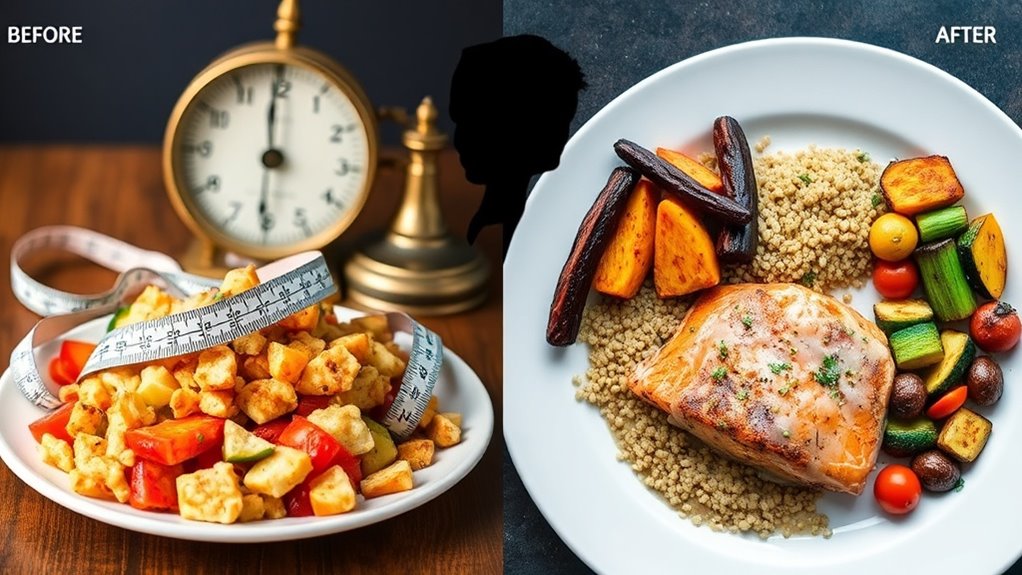What Celebs Eat for Fat Loss (And What You Shouldn’t Copy)
Celebrities often showcase extreme diets that promise quick fat loss, but the reality behind these trends can be quite misleading. While many followers might be tempted to mimic their favorite stars’ juice cleanses or elimination diets, these approaches can lead to serious health issues. Understanding the risks involved and the science behind sustainable weight loss can help you make better choices. So, what should you focus on instead for lasting results?
Key Takeaways
- Many celebrities endorse juice cleanses for quick weight loss, but they lack essential nutrients and lead to temporary results.
- Extreme caloric restrictions may yield rapid weight loss but often result in nutrient deficiencies and unhealthy eating behaviors.
- Elimination diets can backfire, causing cravings and anxiety around food due to their overly restrictive nature.
- Meal replacement shakes are convenient but don’t provide the same satiety and nutrients as whole foods, making them unsustainable for long-term fat loss.
- The idea of “detox” foods is misleading; prioritize a balanced diet with whole foods for effective and sustainable fat loss.
The Juice Cleanse Craze
Have you ever wondered why juice cleanses have become a go-to for many celebrities looking to shed pounds?
While they promise quick results, many celebs make diet mistakes by relying solely on juices.
These cleanses often lack essential nutrients and fiber found in whole fruits and vegetables, leading to temporary weight loss rather than sustainable results.
Studies suggest that extreme juice detoxes can cause fatigue and irritability, undermining health goals.
Instead of mimicking this trend, consider balanced eating habits that support long-term wellness. Additionally, detox drinks primarily promote hydration rather than actual detoxification, highlighting the need for a holistic approach to health.
Learning from celebrity diet mistakes can help you develop a healthier relationship with food and body.
Extreme Caloric Restrictions
Why do so many celebrities turn to extreme caloric restrictions in their quest for rapid weight loss?
These drastic diets can lead to quick results, but they often come with significant downsides.
Severely cutting calories may cause nutrient deficiencies, muscle loss, and metabolic slowdown.
Research suggests that such approaches can trigger binge eating and unhealthy relationships with food.
Instead of mimicking these extreme measures, focus on sustainable, balanced eating habits.
Incorporating whole foods, adequate protein, and regular exercise can promote healthy fat loss without jeopardizing your well-being. Additionally, the psychological impact of extreme dieting can lead to anxiety and stress, further complicating the weight loss journey.
Elimination Diets Gone Wrong
What happens when elimination diets go too far? You might find yourself missing out on essential nutrients, leading to deficiencies that can harm your health.
While these diets can help identify food intolerances, overly restrictive practices often backfire, causing cravings and binge eating.
Research shows that long-term adherence to elimination diets can result in anxiety around food and an unhealthy relationship with eating.
Instead of focusing solely on restrictions, aim for balance. Understanding the impact of food quality can support fat loss while promoting overall well-being.
Incorporating a variety of whole foods can support fat loss while promoting overall well-being.
Relying on Meal Replacement Shakes
Are meal replacement shakes the secret to effortless weight loss?
While they can be convenient, relying solely on these shakes isn’t a sustainable strategy.
Many shakes lack essential nutrients, which can lead to deficiencies over time.
Studies show that whole foods provide better satiety and promote healthier eating habits.
If you decide to use shakes, consider them a supplement rather than a replacement.
Pair them with balanced meals rich in fruits, vegetables, and proteins for optimal results.
Remember, successful fat loss is about creating a sustainable lifestyle, not quick fixes. Additionally, practicing mindful eating can enhance your awareness of hunger signals and improve your overall relationship with food.
The Myth of “Detox” Foods
Meal replacement shakes might seem like a quick fix, but the notion of “detox” foods is another common misconception that can mislead those seeking fat loss.
Many people believe these foods can cleanse the body or kickstart weight loss, but your liver and kidneys already perform these functions naturally.
Instead of relying on trendy detox diets, focus on a balanced diet rich in whole foods like fruits, vegetables, lean proteins, and whole grains.
These provide essential nutrients and promote sustainable fat loss without the pitfalls of temporary detox fads. Additionally, skipping meals can slow metabolism, making it harder to achieve lasting results.
Prioritize long-term health over quick fixes, and you’ll achieve better results.
Overemphasis on Supplements
How often do you find yourself reaching for the latest supplement promising rapid fat loss?
While some celebrities swear by these products, research indicates that they often yield minimal results when compared to a balanced diet and regular exercise.
Supplements can’t replace the nutrients found in whole foods, and over-reliance on them may lead to unhealthy habits.
Additionally, many supplements lack regulation, raising concerns about their safety and efficacy.
Instead of chasing the next trendy pill, focus on sustainable lifestyle changes.
Prioritize whole foods, hydration, and physical activity for effective fat loss that lasts.
Remember, real change occurs over time, and your body will thank you for it.





